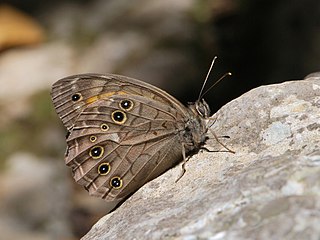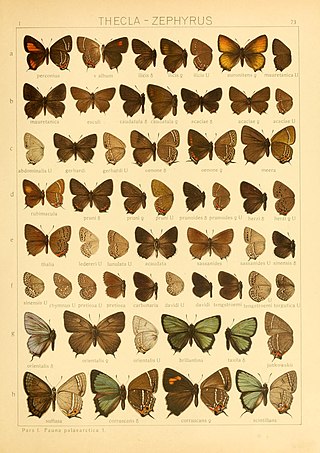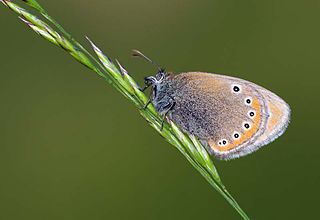
The green hairstreak is a small butterfly in the family Lycaenidae.

The ringlet is a butterfly in the family Nymphalidae. It is only one of the numerous "ringlet" butterflies in the tribe Satyrini.

Graphium is a genus of mostly tropical swallowtail butterflies commonly known as swordtails, kite swallowtails, or ladies. Native to Eurasia, Africa, and Oceania, the genus is represented by over 100 species. Their colouration is as variable as the habitats they frequent; from rainforest to savannah. Some possess tails which may be long and swordlike, while others lack any hindwing extensions. Graphium species are often sighted at mud puddles.

The Zabulon skipper is a North American butterfly first described by the French naturalists Jean Baptiste Boisduval and John Eatton Le Conte from the state of Georgia, United States.

Poa trivialis, is a perennial plant regarded in the US as an ornamental plant. It is part of the grass family.

The purple-edged copper is a butterfly of the family Lycaenidae.

Ornithoptera paradisea, the paradise birdwing, is a species of birdwing butterfly found in New Guinea.

Lasiommata megera, the wall or wall brown, is a butterfly in the family Nymphalidae. It is widespread in the Palearctic realm with a large variety of habitats and number of generations a year.

Zygaena carniolica, sometimes described as the crepuscular burnet or eastern burnet, is a member of the family Zygaenidae.

Kirinia roxelana, the lattice brown, is a butterfly of the family Nymphalidae. It is found in southeastern Europe and the Near East. The butterfly is on wing between May and July. The larvae feed on various grasses.

Chazara briseis, the hermit, is a butterfly species belonging to the family Nymphalidae. It can be found in North Africa, southern Europe, Asia Minor, the Caucasus, Kazakhstan, Central Asia through Afghanistan, and north-western China and Tuva. It is found on steppe and in other dry grassy places between 500 and 2,500 meters.

Cymothoe is a genus of butterflies in the subfamily Limenitidinae, the admirals and relatives. They are known commonly as gliders. The genus is distributed in the Afrotropical realm, where species are found mainly in forest habitat. mainly in the Guinean Forests of West Africa and the Congolian forests.

Kirinia is a genus of butterflies of the family Nymphalidae found in Europe and Asia.

Taenaris is a genus of butterflies in the family Nymphalidae, subfamily Amathusiinae, that distributed throughout Australasia with a majority of species being located on the island of New Guinea. They are commonly known as the owl butterflies.

Satyrium prunoides is a butterfly of the family Lycaenidae. It was described by Otto Staudinger in 1887. It is found in the Russian Far East, Mongolia, north-eastern China and Korea.

Coenonympha leander, the Russian heath, is a butterfly belonging to the family Nymphalidae. It is found in northern Greece, Hungary, Bulgaria, southern Russia, Asia Minor, Armenia and Iran. The habitat consists of warm grassy areas.

Kirinia epimenides is a butterfly in the family Nymphalidae (Satyrinae). It is found in the East Palearctic in Amur, eastern China, Korea, Ussuri, Japan.

Kirinia climene, the Iranian Argus, is a butterfly of the family Nymphalidae. It was described by Eugenius Johann Christoph Esper in 1783. It is distributed in Bulgaria, Romania, Yugoslavia, Macedonia, Turkey, Caucasus, Transcaucasia, Syria, Iraq, Iran and southern Russia.

















